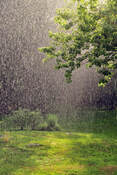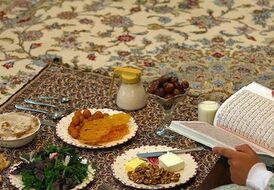|
I was asked by well known Islamic thinker and Quran translator Dr Safi Kaskas to watch a video and then write some questions about the future of the Qur'an based on the state of the future world presented by this video. The video was definitely a wake-up call that we as an ummah need to act and act fast before its too late! We need to educate our families and try to work to stop all this madness and to reclaim our humanity! I believe the Quran can play a major role in solving the current and future problems facing humanity. We need scholars not only to be experts in religious sciences but to also be well-read in areas like science, engineering, arts and humanity, philosophy etc…. Muslims, as a whole, need to be made aware that the Qur'an is a guide for all times and all places and gives solutions for all problems and challenges that were faced in the past; what is faced today and all problems that our children will be face in the future. I will present some pressing issues and explain solutions by applying the Quranic guidance. 1. Inequity of wealth distribution and the increase gap between the rich and poor, how can the Qur'an solve this problem? Allah, Most high, says in the Quran: هُوَ الَّذِي خَلَقَ لَكُم مَّا فِي الْأَرْضِ جَمِيعًا It is He who created for you that which is on the earth, ALTOGETHER. In other words what is on the earth is not exclusive to some at the expense of others. This problem cannot be tackled on an individual level but needs to be done collaboratively as an ummah. We need to apply the example of Yusuf, peace be upon him, to think strategically and plan for long term solutions. We need to think beyond food and clothes parcels and aim to provide education, creation of jobs, establishing self-sustained farming, medical services, planning for catastrophic events like droughts, floods, plagues etc. 2. We are witnessing the destruction of the environment before our very eyes, are we going to be part of the solution or ignore it? The Quran says: وَأَقِيمُوا الْوَزْنَ بِالْقِسْطِ وَلَا تُخْسِرُوا الْمِيزَانَ And observe the measure strictly, and do not lose the balance. Allah, Most High, gives us abundant guidance in this area so that Insh’Allah we can reclaim our environment back and reestablish the balance before it is too late. This is an area that I will expound on in future lessons Insh'Allah. 3. Depression and suicide, what is the Quranic solution? Allah describes human nature لَّا يَسْأَمُ الْإِنسَانُ مِن دُعَاءِ الْخَيْرِ وَإِن مَّسَّهُ الشَّرُّ فَيَئُوسٌ قَنُوطٌ Man does not get tired of asking for good, but if ill touches him, he gives up all hope and is lost in despair. The Quran offers solutions for this problem both at a spiritual, physical and social level. We need psychologists and psychiatrists to apply Quranic guidance on how to solve this issue beyond western medicine. The role of the purification of the internal heart needs to emphasised and be applied in tackling this problem. 4. Genetic engineering and future impact on humans. What does the Quran say? Allah describes Satan’s deception and his misguidance by allowing man to be deceived into thinking he can play the role of the creator by manipulating the creation. This is happening before our very eyes to mankind’s own detriment The Quran says: وَلَأُضِلَّنَّهُمْ وَلَأُمَنِّيَنَّهُمْ وَلَآمُرَنَّهُمْ فَلَيُبَتِّكُنَّ آذَانَ الْأَنْعَامِ وَلَآمُرَنَّهُمْ فَلَيُغَيِّرُنَّ خَلْقَ اللَّهِ And I will mislead them, and I will arouse in them wishful desires, and I will command them so they will cut (splice) the “authorized permissions” of livestock, and I will command them so they will change the creation of Allah. NOTE: the verb بَتَكَ (he cut/ sliced) shares the exact same letters at كَتَبَ (he authorized, decreed), so this cutting is a cutting of something authorized and decreed. Here the verb لَيُبَتِّكُنَّ is an emphasized verb from the root بَتَكَ which means to cut in an emphatic manner that will mean a permanent change. However, this cutting is of an authorization that is decreed by the Creator in the DNA sequence. This is done through a process that involves cutting the DNA (splicing) and changing the nucleotide base sequence by adding and deleting genetic material to “play god” and to follow Shaytan’s desire. Livestock are of the greatest of blessings to mankind and any changes to these animals could have severe implications for mankind! 5. Qur'an and modern science The Qur'an say وَجَاهِدْهُم بِهِ جِهَادًا كَبِيرًا And strive against them with it (the Qur'an) a great striving [in terms of arguments and evidences] Allah commands Muslims to exert their utmost effort to prove that the Qur'an is a divine revelation from the Creator of all the signs and wonders in the universe. We need to intellectually reconcile modern science with the Qur'an. For example, the theory of evolution needs to be re-examined by scholars/scientists that need to take into consideration substantial evidence that shows that we existed at least 200,000 years ago and that human-like creature had existed on earth for a at least 2 million years. At the same time, Muslims need to be true to the language of the Quran, without manipulating it in a manner that would give critics a reason to disprove future arguments and interpretations. 6. How to deal with division and sectarianism and the impact it has on Muslims rising to become the best nation for mankind , who will guide and shape the future for the better? The Quran explains how the people of previous scriptures fell into sectarianism and division وَمَا اخْتَلَفَ الَّذِينَ أُوتُوا الْكِتَابَ إِلَّا مِن بَعْدِ مَا جَاءَهُمُ الْعِلْمُ بَغْيًا بَيْنَهُمْ The People of Scripture did not differ except after knowledge had come to them through transgression among themselves. The word بَغْيًا – transgression includes transgression of diseased hearts from its vices like hatred, greed and envy as well as physical transgression. This division came about not because of lack of knowledge but while they had knowledge. We need to understand that one of the most important commands is to unite under the rope of Allah, the Quran. Our differences need to be put aside and we need to solve the exponentially greater problems affecting our physical and spiritual existence as the ennobled Children of Adam. This can never be done with a diseased heart that lacks mercy and empathy towards others. The Prophet, peace be upon him, came as a mercy for mankind and Muslims who want to emulate him and follow his path need to carry the same message and not an exclusive message for a particular group or sect. By Nabeel Alkhalidy 20 Rajab, 1443 , 22.2.2022 DOWNLOAD THE DOCUMENT IN PDF
2 Comments
Having been a big proponent of revision of tafsir literature in order to sift out fabricated and problematic interpretations, I have received numerous criticisms mainly by traditionalists who advocate holding on to past opinions mentioned in tafsir literature for the past thousand years. One needs to understand that Tafsir works past and present are reference books of opinions and interpretations ( including weak and fabricated sources) that deserve deeper scrutiny and assessment. Tafsir literature is helpful to understand the deep meanings of the Quran, but one needs to understand that they are not revelation. It is the job of scholars that come after to review the different opinions and reach an interpretation(s) that conforms to the language of the Quran, the context, interpreted through the Quran first and foremost ( Tafsir of the Quran with other ayaat of the Quran) and be intellectually sound based on sound reason and reality. One area that had a great deal of interpretation and extraneous details are the stories of the Prophets in the Quran. The most well-known accounts of these stories usually provide details with no sanad ( unbroken chain) to the Prophet (ﷺ) or the early companions who learned directly from him. When one reads tafsir literature they are bombarded by varying opinions and interpretations. Yes, the Quran has a scope for variance as its meanings are vast and different scholars will offer their own perspectives and nuances. This is not what I am talking about. I am speaking about interpretations that lead to clear contradictions and discrepancies. Problems with accepting unsubstantiated narrationsAccepting these narrations and details hinder and sometimes put a barrier on trying to understand the true understanding of the Ayaat in the Quran. I will be specifically looking at the Stories of Prophets in the Quran and how additions to the stories have led to two major problems. They are: 1. That Prophets are in some cases no longer seen as an example to follow, even though the Quran calls their stories عِبرَة – a lesson or instruction to move from one code of conduct or mindset to the most proper one. 2. The “Contextual inconsistency” found in the Quran. The Quran says أَفَلَا يَتَدَبَّرُونَ الْقُرْآنَ ۚ وَلَوْ كَانَ مِنْ عِندِ غَيْرِ اللَّهِ لَوَجَدُوا فِيهِ اخْتِلَافًا كَثِيرًا Then do they not reflect upon the Qur'an? If it had been from any other than Allah , they would have found within it much contradiction. [Surat Al Nisa ayah 82 ] So this is directly related to the integrity of the Quran which is the living miracle of the Prophet SAW and a sign of his Prophethood. Anything that comes from outside from the Quran which compromises this will need to be rejected. An example of "inconsistency" in Tafsir literatureLet us take an example in Surat Saad. Surah 38 One can understand from the beginning of the Surah that hostility from the Arab pagans had increased against the Prophet (ﷺ). After mentioning the direct attacks on him and the message, Allah (سبحانه و تعالى) consoles him and tells him to be patient over all these verbal attacks اصْبِرْ عَلَىٰ مَا يَقُولُونَ وَاذْكُرْ عَبْدَنَا دَاوُودَ ذَا الْأَيْدِ ۖ إِنَّهُ أَوَّابٌ Be patient over what they say and remember Our servant, David, the possessor of strength; indeed, he was one who repeatedly turned back [to Allah ]. Surat Saad 38:17 In the very same ayah, Allah (سبحانه و تعالى) tells RasoolAllah (ﷺ) to reflect on the story of Dawud (عَلَيْهِ ٱلسَّلَامُ). So one would expect a story of great patience and guidance for the Prophet and by extension for us from one of Allah's best creations. Is this what is found according to the well-known interpretations of the story? The answer unfortunately is No! we are told that Nabi Dawud (عَلَيْهِ ٱلسَّلَامُ)became very frightened from a security breach and made a judgement that was incorrect before hearing from both disputants. As the common story goes, he repented from this mistake and Allah (سبحانه و تعالى) forgave him. The common lesson that is given is to listen to two sides of the story before making a judgment. This story however is not found in the Quran. Details were added to it that distorted the story in a way to present Nabi Dawud (عَلَيْهِ ٱلسَّلَامُ) as having a lack of patience. Some Modern scholars have noticed this and have understood that one needs to return back to the actual Quranic text, as the Quran is a self-clarifying book with no need of outside sources. In the very same section of the Quran Nabi Dawud has been described as having الْحِكْمَةَ وَفَصْلَ الْخِطَابِ Wisdom and decisive/ eloquent speech. And one needs to ask, If the story of him being too afraid to think straight and thus hindering him from making the proper judgement, then why did Allah Most high mention it here? It would be out of place. Wouldn't we expect a situation in his life to show his wisdom on show? The actual Quranic account devoid of these extraneous sources is presented here by Ustadh Nabeel Alkhalidy Moreover, in the same section of the Quran we have more inconsistency due to further misinterpretations. Nabi Sulaiman (عَلَيْهِ ٱلسَّلَامُ) and Nabi Ayoub (عَلَيْهِ ٱلسَّلَامُ) are both described in this Surah as نِعْمَ الْعَبْدُ "An excellent slave" Surat Saad, Ayah 30 and 44 One would expect to find the best examples to mankind. Unfortunately, in the well known interpretations of the these stories, we find a Prophet Sulaiman distracted from Allah by his horses, The horses are returned back to him and then he engages in mass slaughter of them for having distracted him. Ask yourself, can this be an action of the best of slaves? Can a Prophet become heedless of Allah and can he destroy animal life in this way? Also, Nabi Ayoub after battling a long sickness had no food for him and his wife. In one instance he became angry because his wife sold her hair to bring food on the table. As the story goes, Ayoub (عَلَيْهِ ٱلسَّلَامُ) became so angry that he made an oath that if Allah (سبحانه و تعالى) healed him from his sickness that he would lash his wife with 100 lashes, a punishment that the Quran prescribes for a fornicator. It took revelation from Allah (SWT) to stop this punishment for his wife that she was obviously not worthy of. Nabeel Alkhalidy here offers the Quranic interpretation of this story: So in these extraneous accounts, we have oppression to animal life and oppression to ones wife mentioned from the best of creations. We also have heedlessness and extreme anger attributed to them.
One will realize after a deep study and reflection that these false accusations made against the Prophets of Allah have absolutely no basis and one needs to free themselves from such stories to reach the true accounts and only then one can understand the lessons and follow them. And Allah knows best. By Nabeel Alkhalidy  One of the countless proofs of the divine nature of the Quran is related to the base letters of Arabic words, their associated meanings and their precise usage in the Quran. No other writing or speech in the Arabic language can compare! An example of this are 3 words used in the Quran that could be considered synonyms for the word rain in English. الودْق المطر الغيث The Quran give us perfect and timeless guidance that if implemented will solve our health problems as a whole. The sad part about this is very few Muslims today follow this guidance. The Guidance is related to 3 aspects about our diet: 1. What to eat, 2. How to eat 3. Where to go to eat.
What to eat? Allah SWT says in Surat Al Baqarah يَا أَيُّهَا النَّاسُ كُلُوا مِمَّا فِي الْأَرْضِ حَلَالًا طَيِّبًا O mankind, eat from whatever is on earth: lawful ( Halal) and good ( Tayyib) The food that we are told to eat has 2 qualities:
In other words it is Halal food that is grown how Allah wants it to be grown and consumed the way Allah wants us to consume it. For example if we look at most supermarket products, much of it is halal per se but the extra additives, flavours, colours etc will turn the food from something that is Tayyib to that which is khabeeth - foul/disease causing. How to eat ? Allah SWT says in Surat Al A'raaf كُلُوا وَاشْرَبُوا وَلَا تُسْرِفُوا ۚ إِنَّهُ لَا يُحِبُّ الْمُسْرِفِينَ eat and drink, but be not excessive. Indeed, He likes not those who commit excess. We are told to eat and drink but not commit israaf (excessiveness). In other words not to over eat and over drink. It’s a very simple instruction but how many of us are actually doing this??? Our protruding bellies are a clear sign we are not following this command. Over-eating will no doubt make one sick in the long run therefore limiting what one eats will go a long way in eliminating food related diseases such as diabetes, coronary heart disease, obesity etc. Where to go to eat ? Allah SWT says in Surat Al A'raaf فَلْيَنظُرْ أَيُّهَا أَزْكَىٰ طَعَامًا فَلْيَأْتِكُم بِرِزْقٍ مِّنْهُ Let him look to which is the purist of food and bring you provision from it This was what the Youth of the Cave advised their comrade after waking up from their sleep. The verb used li yanthur is a command to investigate. If we want to search and investigate for the purist of foods we need to get educated and spend our time and efforts to find out where to get it from. Fruits and vegetable that have been stored for 6 months in incubators and ripened prior to being sold is not the purist of foods. Food that is filled with growth hormones or pesticides is not the purist of foods. Paying a bit extra can go a long way into making our food purer and beneficial rather than disease causing. Question Q. Is paying more to get an organic option considered Israaf ( excessiveness)? A. Excessiveness does not exist when trying to purchase pure and wholesome food, which is actually a command. We need to take the means to good health and rely on Allah. If we are feeding our bodies poison we would contradict the commands of the Quran to eat food that is Tayyib. Our bodies are an amaana ( trust) and we need to treat it as such. Wa Allahu A’lam Nabeel Alkhalidy  The Quran mentions the greatest human genocide in human civilisation that has and will occur until the day of judgement. Allah, Mighty and Wise says: وَإِذَا الْمَوْءُودَةُ سُئِلَتْ بِأَيِّ ذَنبٍ قُتِلَتْ And when الْمَوْءُودَة (the mow'ooda) is asked , for what wrongdoing was she killed? [Surat Al-Takweer 81:8-9] The word الْمَوْءُودَةُ has been traditionally translated by the commentators of Quranic exegesis as the new born female who is buried alive. So the ayaat are speaking about female victims of infanticide being asked about this heinous crime on the day of Judgement. The context of the ayaat
What you notice about the beginning of Surat Al-Takweer is that it speaks of universal phenomena that transcends beyond Arabia. It speaks of the sun losing its light, the stars being dispersed, the mountains moving, close relations being nullified, wild animals being gathered, the sea filled with flames, etc . All these descriptions are in total opposition to their nature which we onserve in this world. A universal understanding of the word الْمَوْءُودَة The word الْمَوْءُودَةُ is from the verb وأد which means to bury or cover over. The word الْمَوْءُودَةُ is feminine and a passive participle and is commonly translated as the female newborn that is buried and covered over. Another way to look at الْمَوْءُودَةُ is to consider it an adjective (sifah) of an omitted mowsoof - the word being described. As an example of this we have in the Quran the word الصَّالِحَات which is usually translated as good/ righteous actions, however the word for actions has been omitted and only the adjective remains. Without the omission the construction would be الأعْمَال الصَّالِحَات - righteous actions We see that the ayah prior to mentioning الْمَوْءُودَةُ speaks of the souls النُّفُوس وَإِذَا النُّفُوسُ زُوِّجَتْ And when the souls are paired up [Surat Al-Takweer 81:7] This ayah speaks of: 1. reuniting the soul with the body at the time of resurrection, and 2. The souls being paired up with their good/bad deeds. Both interpretations have been given by the classical scholars of the Quran So in this interpretation الْمَوْءُودَةُ is describing النُّفُوسُ. So we are talking about النُّفُوسُ الْمَوْءُودَةُ i.e the souls on the day of judgement who are the most helpless and most vulnerable. It is these souls ( both males and females) who have been murdered in cold blood leaving no trace or evidence that a crime has been committed. Note: The greater plural is used in the ayah in contrast to the other plural الأَنْفُس - which is the lesser plural. The greater plural would indicate a larger number of souls than the lesser plural. For more information on plurals in Arabic view our course: PLQ: Plurals in the Quran The greatest genocide in human history One can only speculate how many such souls have been murdered in cold blood, killed by parents or caretakers, killed to cover unwanted pregnancies and crimes, killed because of being a financial burden, disabled, killed in anger, drugs, neglected by parents, war, famine and the list goes on and on and on. And every day the numbers keep increasing!!! Justice for the most vulnerable The first act of justice the Quran mentioned on the day of judgment will be the empowerment of the weakest and most helpless victims of genocide in this life. The murderers will not be questioned, but rather the helpless victim will be asked: what sin had they committed to deserve this? These pure innocent souls, who had no say in this life, will reply and this would begin proceedings in the court of Allah, The Most Wise and Majestic. Wa Allahu A'lam By Nabeel Alkhalidy |
Nabeel AlkhalidyHead teacher of the Sibaway Institute. Archives
February 2022
Categories
All
|
||||||
THE SIBAWAY INSTITUTE |

 RSS Feed
RSS Feed

